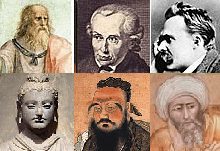On Truth and Lies in a Nonmoral Sense
| Part of a series on |
| Philosophy |
|---|
 |
| Philosophers |
| Traditions |
| Periods |
| Literature |
|
| Branches |
| Lists |
| Miscellaneous |
|
|
On Truth and Lies in a Nonmoral Sense (German: Über Wahrheit und Lüge im aussermoralischen Sinne, also called On Truth and Lie in an Extra-Moral Sense[1]) is a philosophical essay by Friedrich Nietzsche. It was written in 1873, one year after The Birth of Tragedy,[2] but was published by his sister Elisabeth in 1896 when Nietzsche was already mentally ill. The work deals largely with epistemological questions about the nature of truth and language, and how they relate to the formation of concepts.
Summary
Nietzsche's essay provides an account for (and thereby a critique of) the contemporary considerations of truth and concepts. These considerations, argues Nietzsche, arose from the very establishment of a language:
| “ | Every word immediately becomes a concept, inasmuch as it is not intended to serve as a reminder of the unique and wholly individualized original experience to which it owes its birth, but must at the same time fit innumerable, more or less similar cases—which means, strictly speaking, never equal—in other words, a lot of unequal cases. Every concept originates through our equating what is unequal.[3] | ” |
According to Paul F. Glenn, Nietzsche is arguing that "concepts are metaphors which do not correspond to reality."[4] Although all concepts are metaphors invented by humans (created by common agreement to facilitate ease of communication), writes Nietzsche, human beings forget this fact after inventing them, and come to believe that they are "true" and do correspond to reality.[4] Thus Nietzsche argues that "truth" is actually:
| “ | A mobile army of metaphors, metonyms, and anthropomorphisms—in short, a sum of human relations which have been enhanced, transposed, and embellished poetically and rhetorically, and which after long use seem firm, canonical, and obligatory to a people: truths are illusions about which one has forgotten that this is what they are; metaphors which are worn out and without sensuous power; coins which have lost their pictures and now matter only as metal, no longer as coins.[5] | ” |
These ideas about truth and its relation to human language have been particularly influential among postmodern theorists,[4] and "On Truth and Lies in a Nonmoral Sense" is one of the works most responsible for Nietzsche's reputation (albeit a contentious one) as "the godfather of postmodernism."[6]
See also
Notes
- ↑ Walter Kaufmann's translation, appearing in The Portable Nietzsche, 1976 edition. Viking Press.
- ↑ Portable Nietzsche 42.
- ↑ Portable Nietzsche 46.
- 1 2 3 Glenn, Paul F. (December 2004). "The Politics of Truth: Power in Nietzsche's Epistemology". Political Research Quarterly. 57 (4): 576. doi:10.2307/3219819.
- ↑ Portable Nietzsche 46-47.
- ↑ Cahoone, Lawrence E. (2003). From modernism to postmodernism: an anthology. Wiley-Blackwell. p. 109.
Further reading
- Clark, Maudemarie (1990). Nietzsche on Truth and Philosophy. Cambridge: Cambridge University Press. ISBN 9780521348508. Retrieved 19 April 2016.
- McKinnon, AM (May 2012). "Metaphors in and for the Sociology of Religion: Towards a Theory after Nietzsche" (PDF). Journal of Contemporary Religion. 27 (2): 203–216. Retrieved November 2014. Check date values in:
|access-date=(help) - Podgorski, Daniel (January 2016). "Truth and Lies in a Genealogical Sense: Tracing Friedrich Nietzsche's Discussion of Truth through his Life (by Considering Two of his Texts)". The Gemsbok. Retrieved April 2016. Check date values in:
|access-date=(help)